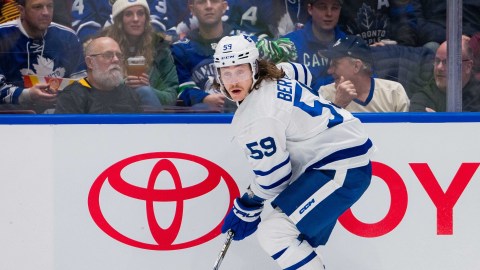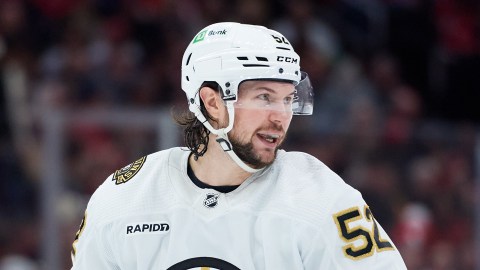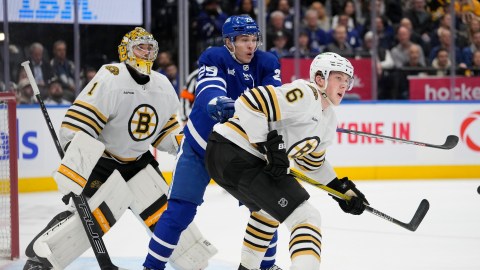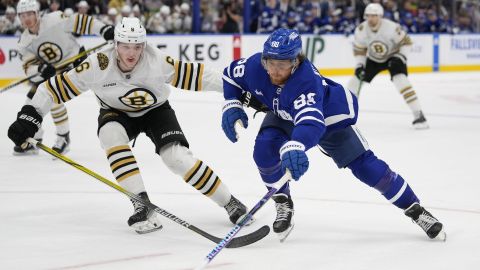Dennis Wideman's 2009-10 season was an unmitigated disaster.
The defenseman struggled early and spiraled downward from there, becoming the whipping boy for Garden fans. He gave them plenty of ammunition as piled up the turnovers while his totals dropped from 13-37-50 with a plus-32 in 2008-09 to 6-24-30 and a minus-14 last year.
So why would his departure — in a trade to bring in much-needed scoring help up front in the form of Nathan Horton — be any reason for concern?
Well, despite his well-chronicled struggles last year, Wideman still added an offensive element sorely lacking on Boston's defense. He showed how effective he could be when on his game in 2008-09, and again late last year, when he rallied to post 3-6-9 totals and a plus-3 in the final 12 games of the regular season and led the club with 12 points in the playoffs.
Wideman was an adventure in his own zone at times, but he was also a puck-mover who could spark the transition game to help create offense. He logged a ton of minutes, trailing only Zdeno Chara on the team with an average of 23:33 a night, then upped that to 26:02 in the postseason.
Bruins general manager Peter Chiarelli said when announcing the deal for Horton that he recognized the potential void he was creating even as he dealt Wideman away, realizing that you have to give something to get something.
"Dennis had a terrific three years in Boston," said Chiarelli. "He hit a couple of bumps along the way this past year. This happens sometimes with skilled players and their confidence. He rebounded to be one of our best players in the stretch run and in the playoffs. He is a clutch competitor and is one of the best passers in the game."
Chiarelli also recognized the need to replace the skill set Wideman brought to the blue line, though he acknowledged there aren't many of those coveted puck-movers available.
"I may not be done in fixing the defense," said Chiarelli, who noted that the club might have to rely more on solid defensive play and positioning rather than acquiring that elusive offensive-minded, puck-moving defenseman.
"I think we have a real good system installed," added Chiarelli. "This search for a puck-mover, sometimes there's not one out there."
Chiarelli did end up going with internal solutions rather than adding another defenseman from outside the organization, as he re-signed Dennis Seidenberg, Johnny Boychuk, Mark Stuart and Adam McQuaid to round out a blue-line corps that also features Chara, Andrew Ference and Matt Hunwick.
"I know we lost some puck-moving in our back end, but I think Johnny Boychuk has come a long way," said Chiarelli after the opening of free agency on July 1. "I think Matt Hunwick is going to turn the corner. I think Andrew Ference, when he's healthy, will be good. I think Stu [Stuart] is going to have a good year. I like the fact that we added Dennis Seidenberg, so I mean a lot of what we did was preemptive of this day."
The Bruins do have reason for optimism with their existing defense. Chara had just seven goals last year, his lowest total since his final year with the Islanders in 2000-01. That was largely due to the hand injury that hampered him most of the year and limited the power he could get on his shot and his ability to stickhandle. He might not get back to the career-high 19 goals he scored in 2008-09, but he should certainly return to the range of the 14 goals a year he averaged in the seven seasons prior to 2009-10.
Boychuk should also be primed for a breakout year. He has the offensive ability (20-46-66 totals in Providence when he won the Eddie Shore Trophy as the AHL's top defenseman in 2008-09) and the confidence after turning in a strong playoff performance playing alongside Chara on the top pairing. He now also has the opportunity to show more of what he can do at this level, having earned the trust of the coaching staff and having been presented with a shot at additional ice time with Wideman gone.
"When they traded Dennis, obviously it maybe makes an opening for me to jump into the top four and maybe play a little bit more minutes than being a [No.] 5 or 6 guy," said Boychuk. "So when they traded Dennis, they maybe sent me a message that 'you better be ready to be a top-four guy.'"
Hunwick will have to be better as well. He came on a bit late last year, but still scored just 14 points in 76 games after contributing 27 points in 53 games in 2008-09. He has the skills to create some offense from the blue line, and the Bruins will need to see some of that potential blossom into production this season.
Seidenberg is known more for his work in his own zone, but he showed more offense than expected in his brief time in Boston, collecting nine points in 17 games before a sliced tendon in his forearm ended his season. Ference won't put up big numbers, but he can move the puck well in the transition game. Stuart and McQuaid are more traditional stay-at-home D-men, but both possess a big enough shot to chip in the occasional goal.
The long-term answer could be prospect Yuri Alexandrov. He needs time to develop and adapt to the North American style of game, but he possesses exactly the kind of mobility and puck-moving skills the Bruins need.
And the Bruins clearly do need more production from the defense. Even with Wideman last year, the defense managed just 32 goals and 153 points. That was down from 50 goals and 184 points the previous year. Only nine teams had fewer goals from their defense last year. Of them, only New Jersey (24), Buffalo (31) and Colorado (28) made the playoffs, and none made it out of the first round. The Devils were the only playoff team that had both fewer goals and fewer points from defensemen than the Bruins, which is hardly shocking considering the low-scoring, trapping style favored by then-coach Jacques Lemaire.
Conversely, the top six teams in defenseman points all made the playoffs, including Cup finalists Chicago (league-leading 188) and Philadelphia, along with regular-season conference leaders Washington and San Jose, and the previous year's Cup champion Penguins.
The Bruins' overall offensive woes as the league's lowest-scoring team last season were a major factor in their struggles throughout the year. And while the additions of Horton and Tyler Seguin will hopefully spark some more production up front, to really compete with the league's elite, Boston will also have to create a lot more offense from the blue line this season.
NESN.com will answer one Bruins question every day in August.
Thursday, Aug. 12: is David Krejci ready to be a No. 1 center?
Saturday, Aug. 14: Will this be the last season in Boston for Zdeno Chara and Patrice Bergeron?



